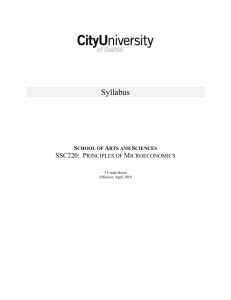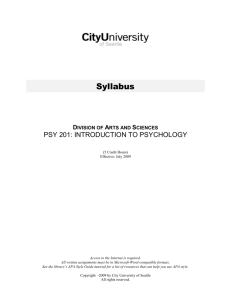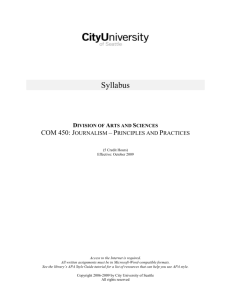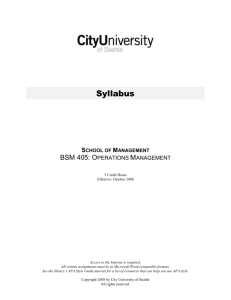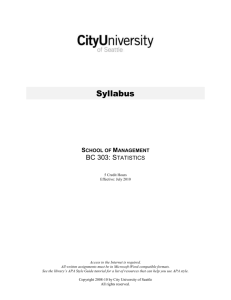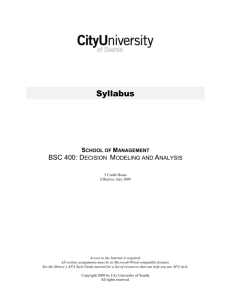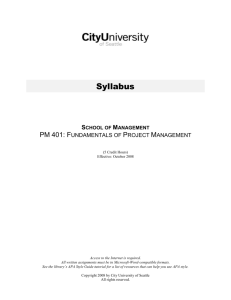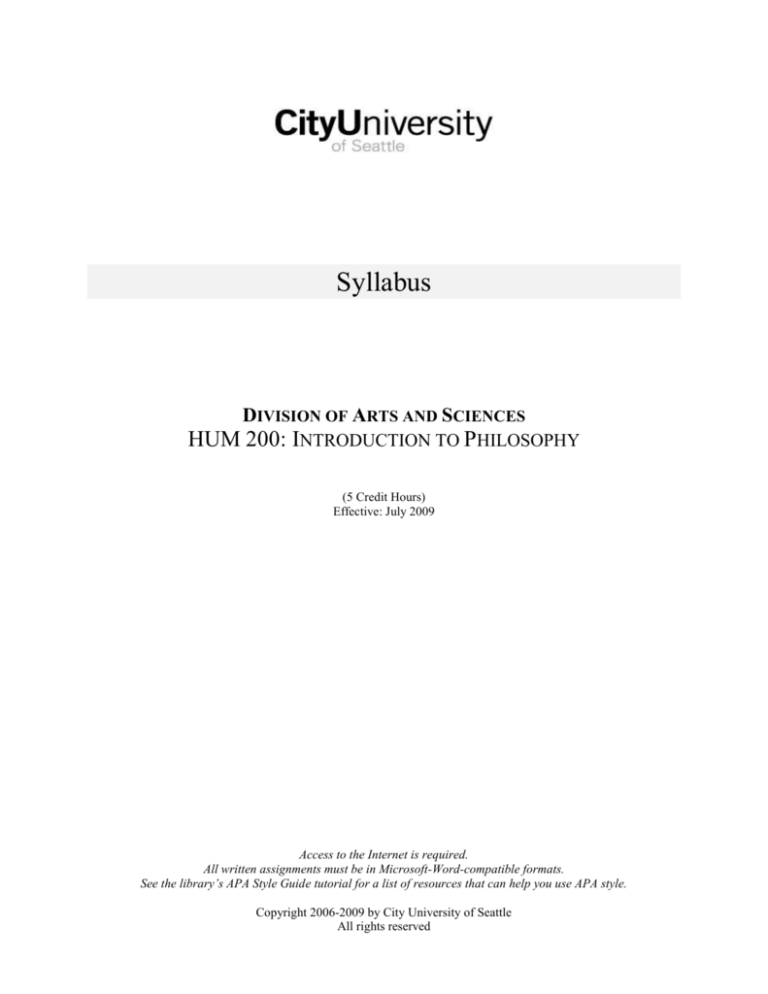
Syllabus
DIVISION OF ARTS AND SCIENCES
HUM 200: INTRODUCTION TO PHILOSOPHY
(5 Credit Hours)
Effective: July 2009
Access to the Internet is required.
All written assignments must be in Microsoft-Word-compatible formats.
See the library’s APA Style Guide tutorial for a list of resources that can help you use APA style.
Copyright 2006-2009 by City University of Seattle
All rights reserved
HUM 200: INTRODUCTION TO PHILOSOPHY
FACULTY
Faculty Name:
Contact Information:
[Instructor may insert personal message if desired]
COURSE DESCRIPTION
This course provides an overview of classical and contemporary philosophical theories. Topics addressed
include: theories of knowledge; the nature of mind; the status of science; ethics; social and political
philosophy; aesthetics; and the philosophy of religion.
COURSE RESOURCES
Required and recommended resources to complete coursework and assignments are listed on the
My.CityU portal at Library>Resources by Course.
CITYU LEARNING GOALS
This course supports the following City University learning goals:
Critical thinking
Diverse and global perspectives
PROGRAM CONTEXT
“Introduction to Philosophy” fulfills lower-division humanities credits
COURSE OUTCOMES
In this course, learners…
Compare and contrast classical and contemporary theories in Western philosophy
Apply philosophical concepts to contemporary events
Assess the purpose of philosophy and the value of philosophical inquiry
CORE CONCEPTS, KNOWLEDGE, AND SKILLS
Major philosophical theories
Identifying inadequate, insufficient, and illogical premises and arguments
Formulating logical arguments to support conclusions
Critical thinking
HUM200
Page 2
Eff: 07/09
OVERVIEW OF COURSE GRADING
The grade you receive for the course will be derived using City University of Seattle’s decimal grading
system, based on the following:
Overview of Required Assignments
% of Final Grade
Instructor-Determined Assignments
Five Application Papers (equally weighted)
25%
75%
TOTAL
100%
SPECIFICS OF COURSE ASSIGNMENTS
Your instructor will provide grading rubrics that will provide more detail as to how this assignment will
be graded.
Instructor-Determined Assignments
Students are expected to participate in weekly discussions and activities. Discussions and activities may
include group projects, short papers, individual discussion assignments, research, case study analysis,
peer critique, journals, and quizzes.
Class participation through discussion is an integral part of this online course, although it is typically less
formal than other work submitted throughout the course. Participation is defined as active engagement in
a discussion or other online activity.
To provide a structure for balanced participation and allow you to maximize the benefit of the discussion
boards, it is recommended that you follow these guidelines:
1) Post your responses to discussion questions in the first three days of the school week (Monday
through Wednesday).
2) Post three or more thoughtful and topic-relevant comments to responses made by classmates
during the last four days of the school week (Thursday through Sunday).
3) Respond to any questions that your instructor or peers have regarding your original post by the
end of the school week.
Grading Criteria for Each Discussion Activity
Meets requirements of the activity in a timely manner
25%
Adds insightful or new ideas, comments, or questions relevant to the
activity and/or to other students’ posts
Appropriately references readings, material in course sessions and other
postings
Writes clearly, concisely, and grammatically
25%
TOTAL
100%
HUM200
Page 3
Eff: 07/09
25%
25%
Application Paper #1
Discuss how we can tell the difference between truth and fiction. Think of one of two things that you
know to be true, and, using some of the ideas and arguments of philosophers discussed in the textbook,
demonstrate how you know what you know and how you know it to be true.
The paper should be five pages long, including the title page and bibliography.
Grading Criteria for Application Paper #1
Organization and coherence
Evidence and support
Analysis and use of course concepts
Style and mechanics
20%
30%
30%
20%
TOTAL
100%
Application Paper #2
For the second application paper, you may choose either of the following prompts. The first prompt is
based on the material covered in Chapter Three: Metaphysics and the Philosophy of Mind. The second is
based on the material covered in Chapter Four: Philosophy of Science.
(A) Choose one of the three theories of the mind/body relation discussed in Chapter 3, and argue that it is
true.
(B) If the final test of a scientific theory is its acceptance by the community of men and women who are
called “scientists”, does that mean that anything is acceptable science as long as enough of the right
people agree with it?According to the Sapir-Whorf hypothesis, we “think” through language. In this
paper, explain the Sapir-Whorf hypothesis, and, using the example of politically correct language, explain
whether these terms have made a difference in the way we think and behave. Are politically-correct
changes in our vocabulary justified? Discuss your opinion of the Sapir-Whorf hypothesis.
The paper should be five pages long, including the title page and bibliography.
Grading Criteria for Application Paper #2
Organization and coherence
Evidence and support
Analysis and use of course concepts
Style and mechanics
20%
30%
30%
20%
TOTAL
100%
Application Paper #3
Should doctors and hospitals consider whether patients have been good or bad persons when deciding
who should get the next available heart or liver for transplant? Should they consider the age of the
patients? How much they can contribute to society? Or should the organ transplants be distributed on a
first-come first served basis? Why?
HUM200
Page 4
Eff: 07/09
The paper should be five pages long, including the title page and bibliography.
Grading Criteria for Application Paper #3
Organization and coherence
Evidence and support
Analysis and use of course concepts
Style and mechanics
20%
30%
30%
20%
TOTAL
100%
Application Paper #4
Choose one of the following options:
Option One: According to Mill, we should judge public policies on the basis of their tendency to produce
the greatest happiness for the greatest number. Select one of the issues currently being debated in the
United States - drug policy, national healthcare, the balanced budget, waterboarding for interrogating
‘combat opponents' - and try to analyze it in terms of the tendency of the competing proposals to promote
the greatest happiness. Is it possible to analyze public policies in this way? What are some of the
problems? Does Mill's way of thinking clarify the issues for you?
Option Two: Imagine that you sit on the Advising Board for a small but prestigious, avant-garde museum.
A wealthy patron has proposed that the photographs of Joel-Peter Witikin* be exhibited, and it is your
responsibility to write a response to that proposal. In a philosophical essay, please explain why these
photographs should be displayed at the museum, or why not. Please utilize the theories of art developed
by Plato, Aristotle, Marcuse, and Danto, whenever it is fitting to do so.
The paper should be five pages long, including the title page and bibliography.
Grading Criteria for Application Paper #4
Organization and coherence
Evidence and support
Analysis and use of course concepts
Style and mechanics
20%
30%
30%
20%
TOTAL
100%
Application Paper #5
Consider the following statements:
"At first it seems easy enough to draw a distinction between real religion and mere cults. But the closer
we look into the matter, the harder it becomes to identify the traits or characteristics that clearly
distinguish what we are inclined to consider genuine religions from what we want to dismiss as cults. The
size of the group surely cannot be, by itself, the determining factor, for every one of the major religions to
which we give respect and recognition started life as a small band of believers. One need only think, for
example, of Jesus and his twelve disciples."
"Thomas Hobbes, in Leviathan, offers an extraordinary pair of definitions of religion and superstition that
HUM200
Page 5
Eff: 07/09
dramatically highlight the difficulty in distinguishing religions from cults. "Fear of power invisible,
feigned by the mind, or imagined from tales publicly allowed [is] religion; not allowed [is] superstition."
Do you agree or disagree with Hobbes' statement? If this statement is true, does it follow that religions are
discredited as substantively similar to superstitions? What claims does religious thought have on truth?
Please present a Classical Argument in your essay, drawing where you can on quotations from the
textbook. These may certainly come from the chapter on religion, but note that religion can also be
important to social and political theory, ethical theory, and other areas of philosophy.
The paper should be five pages long, including the title page and bibliography.
Grading Criteria for Application Paper #5
Organization and coherence
Evidence and support
Analysis and use of course concepts
Style and mechanics
20%
30%
30%
20%
TOTAL
100%
COURSE POLICIES
Late Assignments
Per Division of Arts and Sciences policy, undergraduate students are required to submit all assignments
by the due dates stated in the syllabus. A late assignment is one that is submitted after the due date and
time or after any extension has expired.
If circumstances prevent a student from meeting the due date, the student is obliged to contact the
instructor and request an extension at least 48 hours prior to the date the assignment is due. Emergency
situations will be considered on a case-by-case basis. Being busy, pressured with outside work, or having
competing academic commitments are not valid reasons to grant extensions.
A student who receives an extension in advance of the due date and abides by the agreement with the
instructor is not subject to late penalties.
Without prior arrangement with the instructor, students who submit assignments late will receive a 15
percent deduction in grade each day or part of the day that the assignment is late. For example, if the
assignment is submitted two days late, 30 percent of the grade will be deducted.
Coursework received after one week (seven days) will not be graded and will receive a zero grade.
Participation
Undergraduate online and mixed-mode classes are required to use the Blackboard Discussion Board
online. Participation through discussion to exchange knowledge, ideas, and thoughts is an integral,
mandatory part of this course. Participation on the Discussion Board – the virtual classroom – enhances
the student’s learning process and experience in this course, and lack of participation will result in a
reduction in grade (see grading rubric).
HUM200
Page 6
Eff: 07/09
Participation is active engagement in discussions in the form of sharing new ideas, examples and
resources, as well as constructive disagreement and incorporation of course materials and concepts in
comments. This requires frequent monitoring of the Discussion Board, timely responses, integration of
course material and other sources, and ongoing conversations that extend, modify, and add to
understanding, creating a vibrant learning community.
The following guidelines apply to all DAS undergraduate online and mixed-mode classes:
1. For fully online courses, students are expected to spend one hour per credit hour per week
participating in online activities (for example, for a 5-credit course, the student would spend 5
hours per week on the Discussion Board). It is expected that students access their Blackboard
course shell, including the Discussion Board, a minimum of 3 days per week.
For mixed-mode courses, students are expected to spend the allotted online hours participating in
online activities (for example, for a 5-credit mixed-mode course where 3 hours are spent face-toface in a classroom, students would spend 2 hours per week on the Discussion Board).
2. The instructor will provide 2 or more discussion board questions/assignments by early Monday
each week (normally 2 or 3 per week for fully online classes, and one or more for mixed-mode
classes). Students must post their initial comments to each discussion board question/assignment
no later than midnight Wednesday.
3. For each discussion question/assignment, a minimum of 3 thoughtful and topic-relevant responses
to classmates’ comments are required no later than midnight Sunday. Explain why you agree or
disagree, ask questions, add to or modify ideas, and respectfully find strengths and weaknesses in
classmates’ ideas.
4. In order to encourage discussion, it is expected that students will participate throughout the week
rather than waiting until Sunday to post all responses.
5. Each post should be at least one well-developed paragraph (no less than 10 sentences in length).
“Good post” or similar responses are not considered contributions to class discussions and will
not count toward posting requirements.
6. In addition to making at least 3 responses to classmates’ comments per discussion
question/assignment, students must respond to all questions posed to their initial discussion
comments.
7. All posts must have correct grammar, spelling, punctuation, and APA style.
8. Students are expected to act professionally and respectfully, avoiding personal attacks. Instructors
have the right to remove inappropriate posts, and students will be held accountable to City
University guidelines for student conduct.
Professional Writing
Assignments require error-free writing that uses standard English conventions and logical flow of
organization to address topics clearly, completely, and concisely. CityU requires the use of APA style.
UNIVERSITY POLICIES
You are responsible for understanding and adhering to all of City University of Seattle’s academic
policies. The most current versions of these policies can be found in the University Catalog that is linked
from the CityU Web site.
Scholastic Honesty
Scholastic honesty in students requires the pursuit of scholarly activity that is free from fraud, deception
and unauthorized collaboration with other individuals. You are responsible for understanding CityU’s
HUM200
Page 7
Eff: 07/09
policy on scholastic honesty and adhering to its standards in meeting all course requirements. A complete
copy of this policy can be found in the University Catalog in the section titled Scholastic Honesty under
Student Rights & Responsibilities.
Attendance
Students taking courses in any format at the University are expected to be diligent in their studies and to
attend class regularly.
Regular class attendance is important in achieving learning outcomes in the course and may be a valid
consideration in determining the final grade. For classes where a physical presence is required, a student
has attended if s/he is present at any time during the class session. For online classes, a student has
attended if s/he has posted or submitted an assignment. A complete copy of this policy can be found in
the University Catalog in the section titled Attendance Policy for Mixed Mode, Online and
Correspondence Courses.
SUPPORT SERVICES
Disability Resources
If you are a student with a disability and you require an accommodation, please contact the Disability
Resource Office as soon as possible. For additional information, please see the section in the University
Catalog titled Students with Special Needs under Student Rights & Responsibilities.
Library Services
In order to help you succeed in this course, you have access to library services and resources 24 hours a
day, seven days a week. CityU librarians can help you formulate search strategies and locate materials
that are relevant to your coursework. For help, contact a CityU librarian through the Ask a Librarian
service. To find library resources, click on the Library link in the My.CityU portal.
Smarthinking
As a CityU student, you have access to 10 free hours of online tutoring offered through Smarthinking,
including writing support, from certified tutors 24 hours a day, seven days a week. Contact CityU’s
Student Support Center at info@cityu.edu to request your user name and password.
HUM200
Page 8
Eff: 07/09

